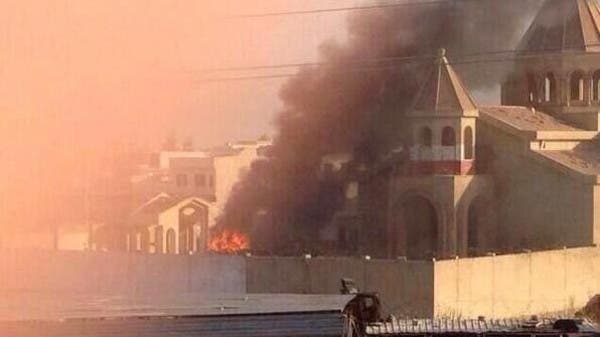
Several Christian news sites are reporting that jihadists in ISIS-controlled Iraq are marking the homes of Christians with a graffiti tag, the Arabic sign “nun”, the first letter of the word “nasara” meaning “Nazarene” or Christian. The meaning of the tag is a warning that the Christians must flee or be killed. Today one of my friends, Gene Packwood, has started using the “nun” sign as his Facebook avatar as a sign of witness.
While I don’t know how widespread the use of this symbol is in Iraq, BBC News is reporting that a significant expulsion of Christians from parts of Iraq is underway. The monastic community of Mar Behnam, southeast of Mosul, was given short notice by ISIS fighters to leave, and were forced to abandon the monastery’s relics. Mar Behnam was founded in the 4th century AD, and has been a pilgrimage site and part of the Syriac Catholic Church. The BCC also reports that Mosul’s Christian population has largely fled, after being given an ultimatum to leave, convert, or pay an ancient Islamic tribute tax known as the jizya. A similar ultimatum was given to the Christian community in the Syrian city of Raqqa earlier this year. The English branch of Al Arabiya reports that an 1800 year old church in Mosul and its library have been burned, and a tomb thought to be that of the prophet Jonah has been destroyed.
Christians mourning this persecution of our brothers and sisters in iraq should also remember that ISIS is doing much the same or worse to Shiite Muslims and destroying their shrines and holy places. We need to pray for them as well as for our fellow Christians.
it’s tempting to see this mayhem as proof of the irrationality and dangerous nature of religion, but for a broader view, for those who have the time, I recommend a piece by Gregory Gause of the Brookings Institute on how sectarianism is being used as a weapon in a larger Middle East cold war. Here’s an excerpt.
"The current confrontation has an important sectarian element, but it cannot be accurately understood simply as a 'Sunni versus Shia' fight. Applying such a framework can distort analytical focus, oversimplify regional dynamics, and cause Iran and Saudi Arabia's motives to be misunderstood. Riyadh and Tehran are playing a balance of power game. They are using sectarianism in that game, but both have crossed the sectarian fault line in seeking regional allies. The regional cold war can only be understood by appreciating the links between domestic conflicts, transnational affinities, and regional state ambitions. It is the weakening of Arab states, more than sectarianism or the rise of Islamist ideologies, that has created the battlefields of the new Middle East cold war. Indeed, it is the arc of state weakness and state failure running from Lebanon through Syria to Iraq that explains the current salience of sectarianism. Given how difficult it will be to reconstruct stable political orders in these and other weak states, the likelihood is that the new cold war will be as protracted as the Arab cold war was."


1 comment:
"it’s tempting to see this mayhem as proof of the irrationality and dangerous nature of religion"
QED
The men on the ground aren't doing it as a balancing of Saudi vs Iranian strategic interests. The people pulling the triggers are praising 'God'.
Post a Comment